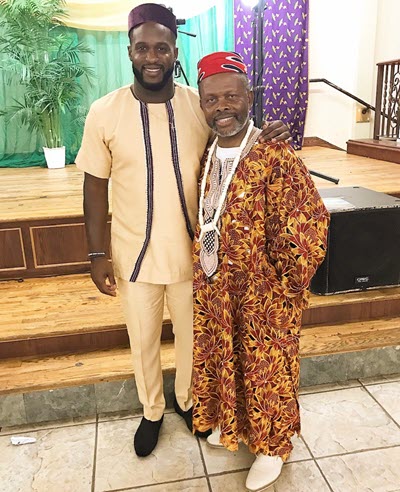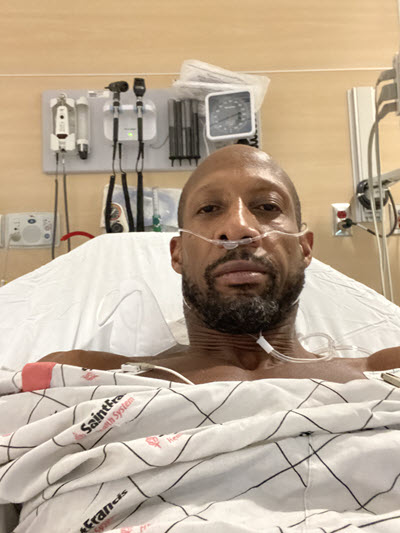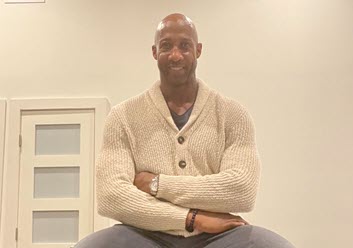For the Health of the Community
Employees Justin and Ken discuss healthcare disparities for Black Americans, wellness, and Baxter's commitment to racial justice.

Q: Tell us about your career journey and what you do at Baxter.
Justin: I attended and played football at Texas State University before joining Baxter. I soon took on a field sales representative role, and in 2021 was promoted to Regional Business Manager within our Integrated Care Solutions team. In my current role, my team and I assist hospitals with their acute Continuous Renal Replacement Therapy (CRRT), hemodialysis and hemodynamic patient monitoring needs.
Ken: I joined Hillrom as an area vice president in 2018 and became part of the Baxter team in late 2021, as part of the acquisition. My current role is vice president of Strategic Solutions for enterprise accounts serving the western portion of the U.S. I'm also a proud U.S. Army veteran; I served a total of 16 years between active duty, the Army Reserve and National Guard.
Q: Tell us about interactions with healthcare that you or your family have experienced.

Justin: In 2013, when I was a senior in college, I came home to visit my parents over the holidays and noticed several boxes with the blue Baxter logo piled high in the hallway of their home. My father, who was only 55 years old at the time, had been diagnosed with renal failure and had begun peritoneal dialysis (PD) treatment, which allowed him to manage his therapy at home. While my dad waited for a kidney transplant, Baxter PD products helped sustain his life for two years, until his kidney function deteriorated to the point that he had to initiate in-center hemodialysis three days a week for about four hours per day. This took a toll. Often, he was too tired or too weak after treatment to safely drive himself, so we worked together as a family to get him home safely from the clinic. In November 2018, he received the phone call we had all hoped for – he was finally approved to receive a kidney transplant. The transplant was a complete success, and I’m happy to share that he has been doing great ever since!
Ken: I consider myself a very healthy person – I exercise almost every day, practice mixed martial arts, and am meticulous about what I eat and drink. But despite all that, COVID-19 nearly took my life. I got the virus in January 2021 and my health quickly took a serious turn for the worse. I was in the hospital for four weeks. I had bilateral pneumonia in 80% of my lung tissue, acute respiratory failure, a pulmonary embolism and four blood clots. I was getting 16 liters of oxygen every minute just to survive, but I made it through. What kept me going was my strong faith, the will to survive, and the tremendous outpouring of support I received from my colleagues who sent cards, recorded video messages, and made sure I didn't feel alone.

Q: Throughout Black History Month 2022, Baxter shined a spotlight on health and wellness issues within the Black community. What did your experiences illuminate about access to care?
Justin: I learned that I really wanted to help others in my community who are dealing with similar health issues. African Americans have some of the highest rates of diabetes and high blood pressure1 – the two leading causes of kidney disease – and in some instances less access to insurance and medical care, which can lead to delayed diagnosis and faster progression of the disease. That's a big part of why I joined Baxter, because we play such a huge role in keeping my dad, and many others like him, alive.
Ken: It taught me to be grateful. Although health and wellness have always been extremely important to me, the battle with COVID-19 made me appreciate having the most basic of abilities – to breathe, to eat, to walk of my own power. I’m also grateful for the medical benefits that helped offset the uncovered expenses of my COVID treatment in the intensive care unit. African Americans are much more likely to be uninsured or underinsured2, and therefore face considerable barriers in receiving the health services they need to overcome a devastating setback like that.
Q: Why is it important for Baxter to shine a spotlight on disparities in healthcare and their impact on communities of color?
Justin: It's important because these disparities are real, and the statistics show it. I’m proud to work for a company that "puts its money where its mouth is" – not just as a one-time act, but as an ongoing commitment to improving healthcare equity. I've been involved with Activating Change Today (ACT), Baxter's racial justice initiative, which has done some great work to help remove barriers to diabetes care in Black communities, expand the pipeline of Black students in health and science fields, increase African American talent in our workforce and support health centers that served medically marginalized populations.

Ken: I think it's hugely important. To me, this issue is all about access: access to healthy food, quality medical facilities, reliable information, and of course, health insurance. I believe the goal and focus should remain on these key pillars so everyone can receive the care they need, including those who are underserved. I'm thrilled with Baxter's efforts, especially that we continue measuring the results so we know we're moving the needle in reducing healthcare disparities across different ethnicities, cultures, and socioeconomic groups.
Activating Change Today
Learn about our multi-year initiative to advance inclusion and racial justice.